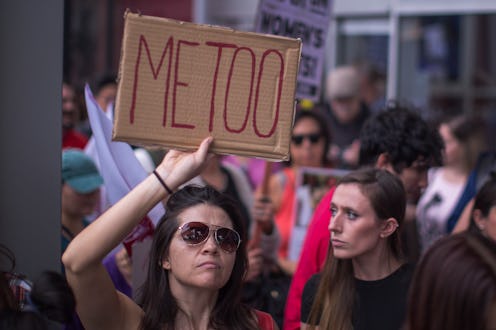News
Sexual Assault Services Can’t Keep Up After #MeToo — Here’s What You Can Do To Help

As the #MeToo reckoning encourages more brave people to come public with their experiences of sexual assault and harassment in and out of the workplace, it's easy to get wrapped up in high-profile outings. In the midst of "who's next" sensationalism, we should also remember that sexual assault involves women and men of far less publicized backgrounds, not just celebrities and Hollywood executives. One indication: In the wake of the #MeToo movement, sexual assault hotlines are receiving a record number of phone calls and messages, reported Reuters. Now sexual assault service organizations are scrambling to keep up with the flood of calls.
The National Sexual Assault Hotline saw a surge in calls that began in October 2017, afterThe New York Times unraveled Harvey Weinstein's decades of alleged sexual abuse. Weinstein issued an apology, but denied allegations he harassed female employees over nearly three decades. The Weinstein scandal and subsequent #MeToo rising encouraged more sexual assault survivors to reach out to the hotline, with people waiting up to three hours to talk to someone.
The Rape, Abuse & Incest National Network (RAINN) runs the 24-hour, toll-free national hotline. According to RAINN, the number of calls to the hotline increased by 25 percent in November, followed by an additional 30-percent spike in December. To meet the high volume of calls, RAINN added 40 employees to its staff of 200 and is urgently recruiting volunteers, CEO Scott Berkowitz told Reuters.
“It wasn’t just a one-time thing,” said Celia Gamboa, a national hotline manager, to Reuters. “We’re just going to continue to see that type of flow into the future.” The chat app most callers prefer has been flooded with messages and the #MeToo movement almost always comes up, Gamboa said.
Those interested in volunteering for the National Sexual Assault Hotline can apply online. Alongside RAINN, there are other national organizations that are closely following the #MeToo movement and victim support.
The National Sexual Violence Resource Center has created an action kit filled with resources for those planning an event during April's Sexual Assault Awareness Month.
The Joyful Heart Foundation is calling on people to urge their government representatives to fund rape kit testing and end the backlog of untested rape kits. In 2015, the Department of Justice estimated the nationwide number of untested rape kits to be as high as 400,000. The foundation also produced a documentary, I Am Evidence, that follows four women whose rape kits went untested for years as they navigate the criminal justice system.
The organization 1in6 addresses research that says one in six men who have experienced sexual abuse at some point during their childhood. Men may be hesitant to disclose these experiences because "societal expectations about what it means to 'be a man' may cause a survivor to suppress his trauma," wrote David Lisak for The Guardian. Lisak is a clinical psychologist and survivor of sexual violence himself. 1in6 offers a 24/7 online hotline and a weekly online support group — both anonymous.
Another organization, the Military Rape Crisis Center, works to end sexual violence in the military. Run by survivors, the center organizes support groups for active duty members and veterans who have been sexually harassed or assaulted. This and any of the before mentioned organizations are just a few examples of groups you can donate your time or money to.
Dismantling a system requires more than just tweets and think pieces, though. Accused sexual harassers and assailants are facing their allegations in the court of public opinion, but few of these cases will go to an actual court. A small percentage of people report their experiences to the authorities, and of the cases that are reported, only 3 to 6 percent ever make it to trial. Contacting your lawmakers to support legislation that combats sexual harassment and assault is another way you can take your advocacy to the next level.